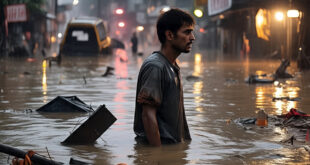- Recently, India and Russia opposed a United Nations Security Council (UNSC) draft resolution on climate change.
- The resolution was co-sponsored by Ireland and Niger and it was first proposed by Germany in the UNSC in 2020.
- It was supported by 113 UN member countries (of a total of 193), which includes 12 of the 15 UNSC members.
Important points:
- The draft resolution sought to create a formal space in the Security Council for discussions on climate change and its implications on international security.
- It also asked that the UN Secretary-General provide periodic reports on how risks from climate change can be addressed to prevent conflicts.
- It also asked the Secretary General to appoint a special envoy for climate security.
- Further, it asked UN field missions to regularly report on climate change assessments in their areas of operation and take the help of climate experts in carrying out their routine functions.
- It has been argued that climate change had an international security dimension.
- Climate change-induced food or water shortage, loss of habitat or livelihood, or migration can exacerbate existing conflicts or even create new ones.
- This can have implications for the UN field missions that are deployed across the world in peacekeeping efforts.
Criticism:
- India said that it was an attempt to shift climate talks from the United Nations Framework Convention on Climate Change (UNFCCC) to the Security Council and a “step backward” for collective action on the issue.
- At the annual climate change conference also, India had forced a last-minute amendment in the final draft agreement to ensure that a provision calling for “phase-out” of coal was changed to “phase-down”.
- The draft resolution, as per India, would undermine the progress made in the right direction.
United Nation Security Council
- The UNs Charter established six main organs of the United Nations, including the United Nations Security Council (UNSC). Article 23 of the UN Charter concerns the composition of the UNSC.
- The UNSC has been given primary responsibility for maintaining international peace and security to the Security Council, which may meet whenever peace is threatened.
- While other organs of the United Nations make recommendations to member states, only the Security Council has the power to make decisions that member states are then obligated to implement under the Charter.
- Permanent and Non-Permanent Members: The UNSC is composed of 15 members, 5 permanent and 10 non-permanent.
- Five permanent members: China, France, the Russian Federation, the United Kingdom, and the United States.
- Ten non-permanent members: Elected for two-year terms by the General Assembly.
- Each year, the General Assembly elects five non-permanent members (out of ten in total) for a two-year term. The ten non-permanent seats are distributed on a regional basis.
- As stipulated in rule 144 of the rules of procedure, a retiring member is not eligible for immediate re-election.
- In accordance with rule 92 of the rules of procedure, the election is held by secret ballot and there are no nominations. Under rule 83 of the rules of procedure, the non-permanent members of the Security Council are elected by a two-thirds majority.
SOURCE: THE HINDU,THE ECONOMIC TIMES,MINT
 Chinmaya IAS Academy – Current Affairs Chinmaya IAS Academy – Current Affairs
Chinmaya IAS Academy – Current Affairs Chinmaya IAS Academy – Current Affairs



